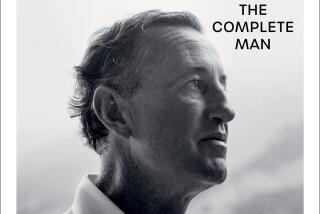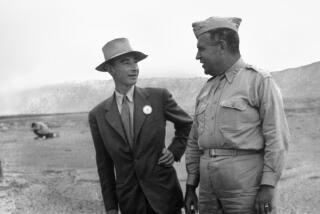Allan Nunn May, 91; Atomic Scientist Was Spy for Soviet Union
- Share via
LONDON — Allan Nunn May, a British atomic scientist who spied for the Soviet Union, has died, according to obituaries published Friday. He was 91
He died Jan. 12 in Cambridge in southern England, the Times and Daily Telegraph reported. They did not give the cause of death.
One of the first Soviet spies uncovered during the Cold War, Nunn May worked on the Manhattan Project and was betrayed by a Soviet defector in Canada. His unmasking in 1946 led the United States to restrict the sharing of atomic secrets with Britain. His discovery ignited a search for other spies inside the Manhattan Project, and led indirectly to Britain’s production of its own weapon.
Born in Birmingham in central England, Nunn May won a scholarship to study physics at Cambridge University, where he was a contemporary of another future spy, Donald Maclean.
Many students in the 1930s were drawn to communism because of the effects of the Depression, the British class system and the rise of fascism and Adolf Hitler and Benito Mussolini. While lecturing at King’s College in London, Nunn May joined a Communist Party group.
By the outbreak of World War II, he was working on a secret British project to develop radar and had allowed his party membership to lapse.
In 1942, he joined a team of Cambridge scientists who, as part of the Manhattan Project, were studying the feasibility of German plans to use heavy water to build an atomic reactor.
A year later, Nunn May was transferred to Montreal, where he was recruited by the Soviet military intelligence agency, the GRU.
In July 1945, when Nunn May told his Soviet controller that he was due to be sent home soon, Moscow decided to get as much out of him as it could. That July 9, a week before the Americans tested an atomic bomb, he passed small amounts of enriched uranium to his Soviet handler, later providing details of the bomb dropped on Hiroshima, Japan. In return, he received $200 and a bottle of whisky.
Shortly after the war ended, Igor Gouzenko, a lieutenant in the GRU and a cipher clerk at the Soviet embassy in Ottawa, defected with documents giving details of Soviet agents, including Nunn May.
By then, Nunn May had returned to Britain, where he was arrested and put on trial. He defended his actions, saying that he had passed information to the Russians only when Moscow was a member of forces allied against fascism. He was convicted and sentenced to 10 years of hard labor, of which he served six.
A quiet, retiring man, Nunn May always insisted that he had been simply sharing vital scientific knowledge. “The whole affair was extremely painful to me, and I embarked on it only because I felt this was a contribution I could make to the safety of mankind,” he once said. “I certainly did not do it for gain.”
The fact that Nunn May, whose Communist sympathies were known, had been allowed to work in such a sensitive area prompted the U.S. Congress to pass the 1946 McMahon Act, which restricted exchanges of atomic information and forced Britain to develop its own bomb alone.
After leaving jail, Nunn May returned to Cambridge, where he married Hilde Broda, a doctor.
In addition to his wife, Nunn May is survived by a son and stepson.
More to Read
Sign up for Essential California
The most important California stories and recommendations in your inbox every morning.
You may occasionally receive promotional content from the Los Angeles Times.













